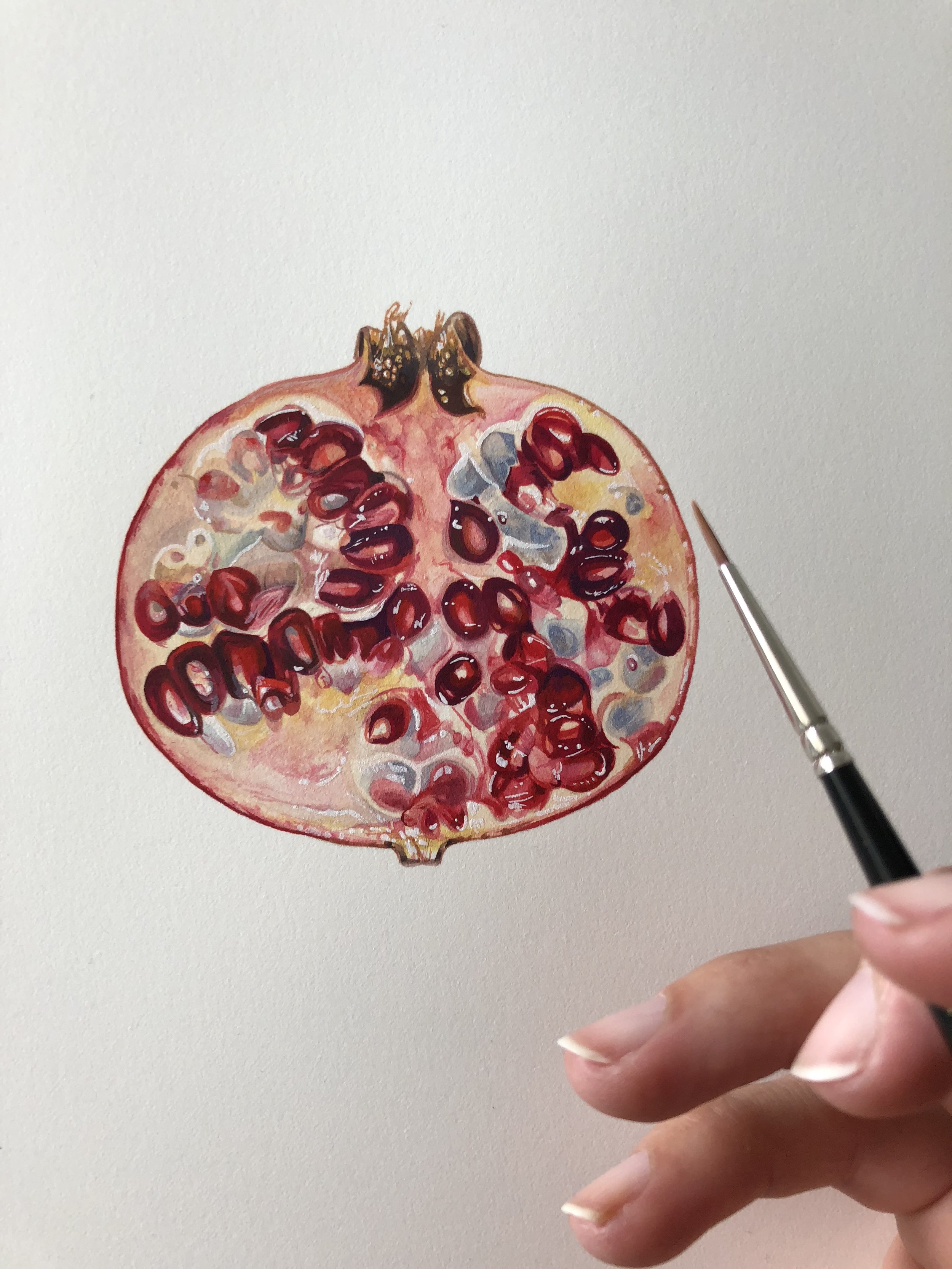Pomegranates
I’m sitting in an airport, the flight is delayed and I am thinking about the Pomegranate painting I am going to visit once more this evening at the Mall Galleries in London. It occurs to me how strange it seems the journey an artwork can take throughout its vast and long life and one that will most likely proceed its creator. Tonight my ‘Pomegranate, Punica granatum’ painting visits London for the second time. This week it will be part of the ‘Plantae’ Botanical Art Exhibition, represented by the Society of Botanical Artists, following a selection earlier on in the year. I am of course hoping the visitors to the Mall Galleries will enjoy
Back in 2018 I exhibited my collection of botanical illustrations, 'Medicinal Fruits and the Symbiosis with their Pollinators', with the Royal Horticultural Society in London. This was an exceptional year for the judges with the show holding the most entrants they had ever hosted, with exhibitors from countries all around the world. I was surprised and honoured to receive an RHS Gold Medal for my collection, which was shown at this event.
This was a fascinating series to work on. As well as harnessing my creativity, an equally gratifying part of being a Botanical Illustrator are the studies I undertake as I create each piece of work. I relish in the discoveries I make during projects, with my research taking me on all kinds of journeys through historical and scientific reference. There never seems to be enough time to explore as much as I would like. However, even when a relatively small body of work goes on behind each illustration, this adds to my understanding and knowledge of each plant. Whilst working on this collection, my research uncovered great swathes of interesting information, not only with regard to the pollinators, but also the discovery of the many health benefits provided by each fruit. One of my favourites to learn about was the pomegranate.
Pomegranate is a 'super fruit’
Pomegranates are one of the great super fruits (although actually classed as a berry) and have many beneficial medicinal properties. Two major components of the pomegranate are punicalagins found in the juice and peel and punicic acid in the form of oil made from the seeds. These contain antioxidant qualities which are found to be three times more potent than those found in green tea or red wine. The significantly high levels of antioxidants in pomegranates have an impressive anti-inflammatory effect, which is proven to reduce cancers, heart disease, type 2 diabetes, Alzheimer’s, arthritis and obesity. They also lower blood pressure, improve erectile dysfunction and act as an anti-bacterial remedy – a truly impressive plant.
Benefits of drinking Pomegranate juice
Studies show that pomegranate extract can slow down cancer cell reproduction, and even induce apoptosis (cell death) in cancer cells. Interestingly, a human study found that 237 ml (8 oz) of pomegranate juice per day can increase the PSA (prostate specific antigen, a blood marker for prostate cancer) doubling time from 15 months to 54 months. This demonstrates a huge reduction in cell growth of the most common type of cancer in men. Whilst more research is required, it also appears that pomegranate may inhibit the production of breast cancer cells. Breast cancer is the most common type of cancer in women, therefore the impacts of this discovery could be groundbreaking. The pomegranate has many assets linked with good health, making it not only a beautiful fruit, but also a valuable one to grow and harvest for medicinal purposes.
Growing Pomegranates in the UK
When I'm working on an illustration I always try and source the living plant to work from. This gives me the opportunity to get a close look at the details from all perspectives, which could be hard to find online or through paper research. During my studies for the 'Pomegranate' illustration, I obtained a small shrub, which has since been growing outside in the garden here in Cornwall. So far, it has been kept potted and sheltered, therefore it hasn't yet had the full opportunity to spread its roots and flourish. However, pomegranates will grow very successfully in the UK in the right conditions. Surprisingly, pomegranate shrubs can survive cold temperatures, even down to minus 10-15 degrees. They use this time to rest and gather energy for use during essential phases of growth.
Ideally you should grow pomegranates against a warm sunny wall. I'm fortunate to have a fairly sheltered south facing garden where I will be planting my shrub in the ground to mature later this year. Whilst mine is currently too small to have a crop of fruit, it is perfectly possible to grow your own here in this country. In fact, it was only some years ago that I saw a pomegranate plant at the Chelsea Physic Garden in London, laden with fruit growing successfully outside.


